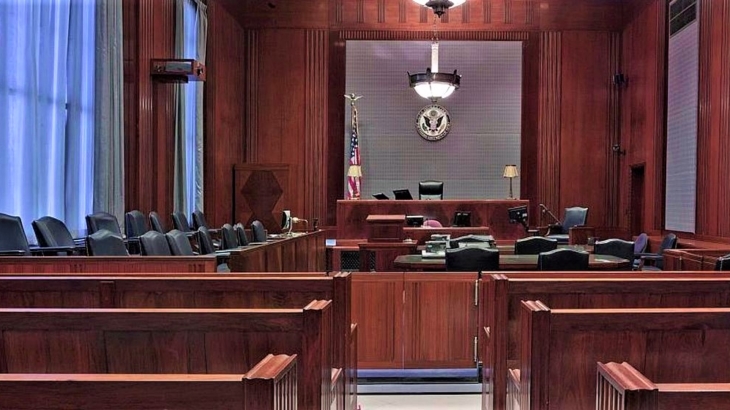Principle of Right to a Speedy Trial by a Jury of Peers, Public and Impartial, Without Cruel or Unusual Punishments

Essay Read by Constituting America Founder, Janine Turner
The right to a trial by jury is one of the core principles of the Anglo-American constitutional tradition. The trial by jury ensures that the government is limited, essential rights are protected, and the rule of law is preserved. As Thomas Jefferson noted to Thomas Paine, “I consider [trial by jury] as the only anchor ever yet imagined by man, by which a government can be held to the principles of its constitution.”
The trial by jury can be traced back to Magna Carta (1215), which King John signed as a limit on royal power. Clause 39 read, “No free man shall be seized or imprisoned, or stripped of his rights or possessions, or outlawed or exiled, or deprived of his standing in any way, nor will we proceed with force against him, or send others to do so, except by the lawful judgment of his equals or by the law of the land.” It protected the right of habeas corpus—meaning that one could not be indefinitely imprisoned.
The English Bill of Rights (1689) confirmed the right to a trial by jury. It also protected related rights for those accused of crimes. The document guaranteed a trial by jury as well as protections against arbitrary government. It outlawed cruel and unusual punishments, excessive fines, and unreasonable bail for the accused.
The English colonists brought this tradition of rights to British North America. They expected to enjoy the rights of Englishmen. The trial by jury became a core issue of the resistance to British tyranny during the 1760s and 1770s. The British began enforcing the Navigation Acts regulating imperial trade more stringently and tried colonial smugglers in Vice-Admiralty courts. These courts did not have juries, and cases were decided by judges. Colonists felt as if they could not get a fair trial and protested this injustice.
In late 1765, delegates from nine colonies attended the Stamp Act Congress in New York. They issued a list of resolutions claiming their rights especially the principle of “no taxation without representation.” They also asserted the right to a trial by jury. “That trial by jury is the inherent and invaluable right of every British subject in these colonies,” the Stamp Act Resolutions read. Many other documents claimed this essential right over the next decade.
The Declaration of Independence asserted the right of a people to overthrow an oppressive government violating their rights. The Continental Congress included a list of grievances against arbitrary government to prove British tyranny and justify separation. One of those grievances was blaming the king for “depriving us in many cases, of the benefits of Trial by Jury.”
When the Framers created the United States Constitution during the Philadelphia Convention in the summer of 1787, they protected some basic rights including habeas corpus and trial by jury. Article III, section 2 guaranteed the right to a trial by jury. It stated, “The Trial of all Crimes, except in Cases of Impeachment, shall be by jury; and such Trial shall be held in the State where the said Crimes shall have been committed.”
During the 1787-88 ratification debate, the opponents of the Constitution, the Anti-federalists, argued for a Bill of Rights to protect individual liberties against a more powerful national government. The Federalists, those who supported the Constitution, promised to create a Bill of Rights in the First Congress. In 1789, Representative James Madison urged his colleagues to craft a Bill of Rights and took the lead in the process.
Congress did pass a Bill of Rights that was ratified by all the states by 1791. It provided widespread protections of rights for the accused including the right to a fair and speedy trial in criminal prosecutions, the due process of law, the right to an attorney, and no cruel and unusual punishments. The Seventh Amendment guaranteed a jury in civil trials.
The right to a trial by jury and related essential rights have been a bedrock of justice and the rule of law in the American constitutional system. Controversies have arisen throughout American history such as the suspension of habeas corpus during the Civil War, the denial of trials for Blacks during slavery and rarely fair trials during segregation, the constitutionality of the death penalty, and the holding of terrorists in Guantanamo Bay without a trial during the War on Terror. During the 1960s, the Court also protected several rights of the accused including the right to a trial by jury for the indigent in Gideon v. Wainwright (1963) and the right against self-incrimination in Miranda v. Arizona (1966).
The right to a trial by jury has been one of the foundations of a just constitutional order and limited government in the British tradition and under the American Constitution. The trial by jury thwarts arbitrary government and provides a rule of law that preserves the liberties of the people.
*****
 Tony Williams is a Senior Fellow at the Bill of Rights Institute and is the author of six books including Washington and Hamilton: The Alliance that Forged America, with Stephen Knott. Williams is currently writing a book on the Declaration of Independence.
Tony Williams is a Senior Fellow at the Bill of Rights Institute and is the author of six books including Washington and Hamilton: The Alliance that Forged America, with Stephen Knott. Williams is currently writing a book on the Declaration of Independence.




Join the discussion! Post your comments below.
Your feedback and insights are welcome.Feel free to contribute!